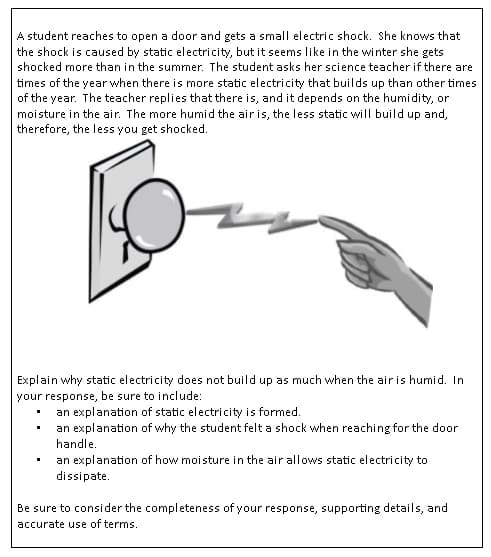A student reaches to open a door and gets a small electric shock. She knows that the shock is caused by static electricity, but it seems like in the winter she gets shocked more than in the summer. The student asks her science teacher if there are times of the year when there is more static electricity that builds up than other times of the year. The teacher replies that there is, and it depends on the humidity, or moisture in the air. The more humid the air is, the less static will build up and, therefore, the less you get shocked. Explain why static electricity does not build up as much when the air is humid. In your response, be sure to include: an explanation of static electricity is formed. an explanation of why the student felt a shock when reaching for the door handle. an explanation of how moisture in the air allows static electricity to diccips+e
A student reaches to open a door and gets a small electric shock. She knows that the shock is caused by static electricity, but it seems like in the winter she gets shocked more than in the summer. The student asks her science teacher if there are times of the year when there is more static electricity that builds up than other times of the year. The teacher replies that there is, and it depends on the humidity, or moisture in the air. The more humid the air is, the less static will build up and, therefore, the less you get shocked. Explain why static electricity does not build up as much when the air is humid. In your response, be sure to include: an explanation of static electricity is formed. an explanation of why the student felt a shock when reaching for the door handle. an explanation of how moisture in the air allows static electricity to diccips+e
Principles of Physics: A Calculus-Based Text
5th Edition
ISBN:9781133104261
Author:Raymond A. Serway, John W. Jewett
Publisher:Raymond A. Serway, John W. Jewett
Chapter20: Electric Potential And Capacitance
Section: Chapter Questions
Problem 60P
Related questions
Question
Please help

Transcribed Image Text:A student reaches to open a door and gets a small electric shock. She knows that
the shock is caused by static electricity, but it seems like in the winter she gets
shocked more than in the summer. The student asks her science teacher if there are
times of the year when there is more static electricity that builds up than other times
of the year. The teacher replies that there is, and it depends on the humidity, or
moisture in the air. The more humid the air is, the less static will build up and,
therefore, the less you get shocked.
Explain why static electricity does not build up as much when the air is humid. In
your response, be sure to include:
an explanation of static electricity is formed.
an explanation of why the student felt a shock when reaching for the door
handle.
an explanation of how moisture in the air allows static electricity to
dissipate.
Be sure to consider the completeness of your response, supporting details, and
accurate use of terms.
Expert Solution
This question has been solved!
Explore an expertly crafted, step-by-step solution for a thorough understanding of key concepts.
This is a popular solution!
Trending now
This is a popular solution!
Step by step
Solved in 2 steps

Knowledge Booster
Learn more about
Need a deep-dive on the concept behind this application? Look no further. Learn more about this topic, physics and related others by exploring similar questions and additional content below.Recommended textbooks for you

Principles of Physics: A Calculus-Based Text
Physics
ISBN:
9781133104261
Author:
Raymond A. Serway, John W. Jewett
Publisher:
Cengage Learning

Physics for Scientists and Engineers: Foundations…
Physics
ISBN:
9781133939146
Author:
Katz, Debora M.
Publisher:
Cengage Learning

College Physics
Physics
ISBN:
9781305952300
Author:
Raymond A. Serway, Chris Vuille
Publisher:
Cengage Learning

Principles of Physics: A Calculus-Based Text
Physics
ISBN:
9781133104261
Author:
Raymond A. Serway, John W. Jewett
Publisher:
Cengage Learning

Physics for Scientists and Engineers: Foundations…
Physics
ISBN:
9781133939146
Author:
Katz, Debora M.
Publisher:
Cengage Learning

College Physics
Physics
ISBN:
9781305952300
Author:
Raymond A. Serway, Chris Vuille
Publisher:
Cengage Learning

College Physics
Physics
ISBN:
9781285737027
Author:
Raymond A. Serway, Chris Vuille
Publisher:
Cengage Learning


Glencoe Physics: Principles and Problems, Student…
Physics
ISBN:
9780078807213
Author:
Paul W. Zitzewitz
Publisher:
Glencoe/McGraw-Hill